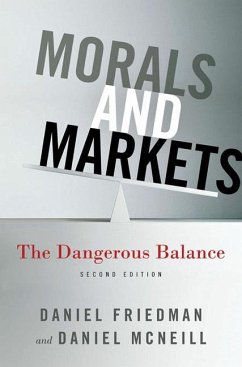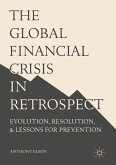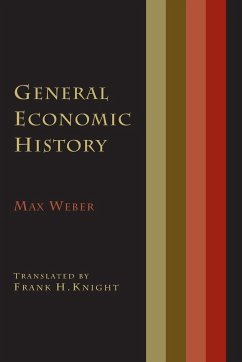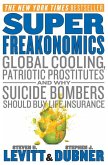Economist Daniel Friedman draws on recent research in evolutionary game theory and behavioral economics to explore the relationship between our moral codes and our market systems. Why are they so often at odds?
Friedman traces the evolutionary history of morals and markets, and argues that both are devices humans have evolved to cope with the inherent conflict between individual and group needs. Morals work well to prevent and solve this conflict within small groups, but tend to break down at larger scale. Markets efficiently organize the activities of very large groups even billions of people but large markets tend to be ruthless, ignoring the needs of individuals and small groups. Friedman shows how imbalance between morals and markets is at the root of such problems as the recent corporate scandals in the United States including the global financial crisis the world continues to face. On the other hand, balance between moral and market concerns has resulted in creative, sustainable solutions to some of our most intractable problems. Acid rain, for example, has been cut in half in large part because of emissions trading programs. Friedman explores this and other ways moral and market forces can be balanced to achieve better solutions than either could on its own.
Friedman traces the evolutionary history of morals and markets, and argues that both are devices humans have evolved to cope with the inherent conflict between individual and group needs. Morals work well to prevent and solve this conflict within small groups, but tend to break down at larger scale. Markets efficiently organize the activities of very large groups even billions of people but large markets tend to be ruthless, ignoring the needs of individuals and small groups. Friedman shows how imbalance between morals and markets is at the root of such problems as the recent corporate scandals in the United States including the global financial crisis the world continues to face. On the other hand, balance between moral and market concerns has resulted in creative, sustainable solutions to some of our most intractable problems. Acid rain, for example, has been cut in half in large part because of emissions trading programs. Friedman explores this and other ways moral and market forces can be balanced to achieve better solutions than either could on its own.
'Morals and Markets shows in example after example that absence of morals and absence of markets leads to poverty and suffering. Our modern society depends upon the balance between the two. And when they break down, as they have in the recent financial crisis, then we have chaos. Friedman and McNeill, who are fascinating on every page, have uncovered one of the fundamental principles of our existence.' - George Akerlof, Nobel Laureate in Economics, 2001
'An engrossing and insightful read that draws on the sweep of human history to show the delicate balance between moral codes and economic market rules. This book should be mandatory reading for ideologues on both sides of the debates on the extent to which self-organized markets, freed of regulation, can be relied on to put food on our tables and keep at bay the beasts within us.' - Daniel McFadden, Nobel Laureate in Economics, 2000
"As we evolved in small bands, and now live in a crowded civilization of seven billion, we face new problems in figuring out how to get along. This book greatly clarifies our situation by providing a world history of economic systems, and by analyzing many of the recent catastrophes of globalization. The writing is exceptionally vivid, the conceptual framework penetrating. It's a real achievement." - Kim Stanley Robinson, author of 2312 and the Mars Trilogy
"Anyone interested in markets and morals perhaps the central issue of our time should read this very interesting and thoughtful book." - Tyler Cowen, Professor of Economics, George Mason University
'An engrossing and insightful read that draws on the sweep of human history to show the delicate balance between moral codes and economic market rules. This book should be mandatory reading for ideologues on both sides of the debates on the extent to which self-organized markets, freed of regulation, can be relied on to put food on our tables and keep at bay the beasts within us.' - Daniel McFadden, Nobel Laureate in Economics, 2000
"As we evolved in small bands, and now live in a crowded civilization of seven billion, we face new problems in figuring out how to get along. This book greatly clarifies our situation by providing a world history of economic systems, and by analyzing many of the recent catastrophes of globalization. The writing is exceptionally vivid, the conceptual framework penetrating. It's a real achievement." - Kim Stanley Robinson, author of 2312 and the Mars Trilogy
"Anyone interested in markets and morals perhaps the central issue of our time should read this very interesting and thoughtful book." - Tyler Cowen, Professor of Economics, George Mason University
'Anyone interested in markets and morals, perhaps the central issue of our time, should read this very interesting and thoughtful book.' - Tyler Cowen, Professor of Economics, George Mason University, USA
'The message markets plus moral is excellent, it is consonant with behavioral game theory's results, including experiments with small-scale societies, and with McCloskey's recent book on bourgeois morality. But, Friedman's message is simpler and clearer.' - Herbert Gintis, Santa Fe Institute, Central Europe University (Budapest), Hungary
'I have been waiting for someone to write this book for a long time. Its use of historical anecdotes to explain why one cannot divorce a society's economics from its social contract is utterly convincing.' - Ken Binmore, Professor Emeritus, University College London, UK
'This book expertly addresses the most important issues confronting the continued evolution of morals and instituions for human socioeconomic betterment.' - Vernon L. Smith, George L. Argyros Chair in Finance& Economics, Chapman University, USA
'The message markets plus moral is excellent, it is consonant with behavioral game theory's results, including experiments with small-scale societies, and with McCloskey's recent book on bourgeois morality. But, Friedman's message is simpler and clearer.' - Herbert Gintis, Santa Fe Institute, Central Europe University (Budapest), Hungary
'I have been waiting for someone to write this book for a long time. Its use of historical anecdotes to explain why one cannot divorce a society's economics from its social contract is utterly convincing.' - Ken Binmore, Professor Emeritus, University College London, UK
'This book expertly addresses the most important issues confronting the continued evolution of morals and instituions for human socioeconomic betterment.' - Vernon L. Smith, George L. Argyros Chair in Finance& Economics, Chapman University, USA









